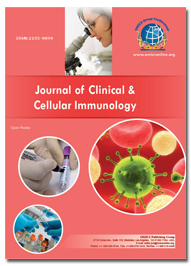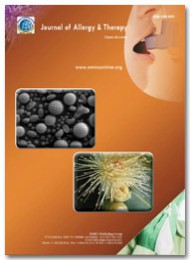Theme: Translating basic immunological discoveries into clinically useful tools
Immunity 2019
Immunology Research 2019 committee is delighted to welcome scientists, researchers, professors, delegates across the globe to its upcoming "World Congress on Immunity and Immuno Therapies" to be held in February 22-23, 2019 Dallas, Texas, USA.
Immunity 2019 is gathering people in academia and society interested in immunology to share the latest trends and important issues relevant to our field/subject area.Immunology Research 2019 brings together the global leaders in Immunology and relevant fields to present their research at this exclusive prestigious program. Immunity 2019will host Scientific and technical sessions on cutting-edge research and latest research innovations in the field ofImmunology and biomedical sciencesacross the globe.
Importance and Scope of Immunity 2019
Immuntywill comprises of major sessions designed to offer comprehensive sessions that address current issues inImmunology and relevant Biomedical Sciences. The attendees can find Exclusive Sessions and Panel discussions on latest innovations in Immunology and Biomedical Sciences, Lectures by the active Investigators,Keynote forumsby Renowned Immunologists,Speaker Forum, Poster Sessions on latest Innovation in all the relevant Areas, Open Innovation Challenges, Poster Sessions on every career stage, Young Research Forum, Post-Doctoral Career Development Session, B2B Meetings, Global Networking with 50+ Countries, Novel techniques to benefit your research, Best platform for Global business and Networking opportunities, Meet the editors of refereed journals, Society and Association members across the Globe, Excellent platform to showcase the latest products inImmunologyand affiliates.
TARGET AUDIENCE
- Immunologists,
- Scientists,
- Young researchers,
- Clinical Researchers
- Manufacturing Medical Devices Companies
- Immunology Researchers
- Delegates from Academies,
- Pharmacists
- Students
- Institutes & Industries besides the professionals from Immunological companies and
- Healthcare Sectors.
GROUP REGISTRATION
For group registration (5 participants and more), please contact the registration department at https://immunologyresearch.conferenceseries.com/registration.php
Note: The First round of abstract submission deadline isSeptember 15, 2018
Major Immunology Associations Globally
- Australian Society for Medical Research
- Immunology Group of Victoria
- The Society for Mucosal Immunology
- The Society for Leukocyte Biology
- Transplantation Society
- British Society of Immunology
- Federation of American Societies for Experimental Biology
- The International Union of Immunological Societies
- Infectious Diseases Society of America
- The Australasian Society for Immunology
- The Australasian Society of Clinical Immunology and Allergy
- The International Society for Interferon and Cytokine Research
- The International Society of Neuroimmunology
- Federation of African Immunological Societies
- Federation of Clinical Immunology Societies
- Immune Deficiency Foundation
- InternationalUnionofimmunological society
- Victorian Infection and Immunity Network
- Australasian Society for Immunology
- Cell Death Society
- European Society of Gene Therapy
Why Vancouver?
Vancouveris a coastal seaport city in westernCanada, located in theLower Mainlandregion ofBritish Columbia. Vancouver has the highest population density in Canada. Vancouver is one of the mostethnicallyand linguistically diverse cities in Canada according to that census; 52% of its residents have a first language other thanEnglish. Roughly 30% of the city's inhabitants are ofChineseheritage. Vancouver is classed as aBeta global city, with its scenic location which makes it a major tourist destination.
Vancouver is also the headquarters offorest productand mining companies. In recent years, Vancouver has become a Centre forsoftware development,biotechnology,aerospace,video game development,animation studiosand television production andfilm industry. The city's strong focus on lifestyle and health culture also makes it a hub for many lifestyle-brands withKit and Ace,Mountain Equipment Co-op,Herschel Supply Co.,Reigning Champ, andNature's Path Foodsall founded and headquartered in Vancouver.
Immunity 2019
- Developmental immunology& Evolutionary immunology
The Department of Developmental Immunology consists of two independent research groups. The immune system develops from hematopoietic precursor cells in the bone marrow. These precursors go through rounds of cell division and differentiation to give rise to the various different lymphoid and non-lymphoid lineages that go to make up the innate and adaptive immune systems.
The immunologists are investigating the origin and evolution of lymphoid organs and the adaptive immune system, the intestinal immune system, and adaptive and innate immunity with a focus on various aspects of immune tolerance. The immune system which initiates its development far before birth with in the fetus and because of which the development continues even after reaching the adulthood. The capacity to react to antigens and foreign invaders is thus dependent on: Age of the person, Type of antigen, maternal factors, Area of body.
- Clinical immunology
It is the study of diseases that are caused by the disorders of immune system. It deals with studies of diseases caused due to disorders of immune system disorders i.e., abnormal growth of any cellular tissues of the system, hypersensitivities such as in asthma and other allergies, immune system failure. It also includes the diseases of other systems, where immune reactions play a vital role in the clinical aspects and pathology. It has been broadly divided into two categories: Immunodeficiency is a category in which there is inadequate response attained by the immune system, whereas in the case of autoimmunity the host body itself attacks its own immune system.
The other disorders which effect immune system include diseases like hypersensitivities (such as in asthma and other allergies) that respond inappropriately to otherwise harmless compounds. Clinical immunologists also studies about the different ways to prevent the immune system's attempts to destroy allografts (transplant rejection).
- Ecoimmunology and behavioural immunity
Immunology is clearly not just for immunologists anymore. It is an example of how successful integrative approaches to biology can be. As its origin has sparked a useful debate on the vast range of topics, from the small molecular methods of immune responses to the role of immunity in Building the evolution of life histories. Eco immunology is the combining aspects of immunology with ecology, biology, physiology, and evolution. Ecological Immunology assumes that immunological defenses must be minimized in terms of cost (energy expenditure). From observing the causes and also the consequences of investment in immune function, which termed the ecological immunology which has successfully transformed multiple sectors of biology, including behavioral ecology, disease ecology and life history evolution. This Behavior Immunity system is said to be consisting of both psychological processes which conclude infection risk from the perceptual cues, and that respond to these perceptual cues through the activation of aversive emotions, cognitions and behavioral impulses.
Behavioral immune system has been recorded across many animal species, including humans. It is said that the Technique which comprise the behavioral immune system has been evolved as a crude first line of defense against disease-causing pathogens
- Immunotherapy
Immunotherapy is the "treatment of disease by inducing, enhancing, or suppressing an immune response". Immunotherapy, which is also called as the biologic therapy, is a kind of cancer treatment which will boosts the body's natural defenses against cancer. It uses substances that are made by the body or in with in a laboratory to improve or restore immune system function.
The immune system helps your body fight infections and other diseases. It is made up of white blood cells and organs and tissues of the lymph system. Immunotherapy is a treatment where substances used are made from the living organisms to treat cancer. The immune system is framed up of white blood cells and the organs plus tissues of your lymph system, like the bone marrow. Its main work is to boost your body to fight off the diseases and to stay healthy.
- Diagnostic immunology
Diagnostic immunology is a method by which we can diagnose the disease caused by a particular infectious microorganism, different types of immunoassays have been developed. This relies on antigen-antibody reaction for detection of the disease. Immunologic methods are used as tools to treat and prevent of diseases such as infectious and immune-mediated diseases. The field of diagnostic immunology has advanced significantly over the years. Immunodiagnostics is a method which mostly relies on the antigen-antibody reaction for the detection of a disease. Immunologic theories are been employed and used as the tools in the treatment and prevention of infectious diseases as well as the immune-mediated diseases. They have high specificity and sensitivity which all depends on the value of antibody detection.
- Cancer immunology
It is the branch of biology that is deals with the understanding of the immune system about how it develops cancer; the most well-known theory is cancer immunotherapy which utilizes the immune system itself as a treatment for reducing cancer. The immunosurveillance and immunoediting are based on the protection of the individuals against development of tumors in animal systems and the identification of targets for immune recognition of human cancer.
Cancer immunology has matured into a vibrant discipline, impacting both basic cancer research and clinical oncology. Investigations into the host-tumor relationship have delineated a complex interplay of cancer cells, stromal elements, and immune components.
- Reproductive immunology
Reproductive immunology is a part of medicine which studies about the interactions between the immune system and the components that are related to reproductive system immunological interactions across the blood testis barrier. It is unit of the science that deals with research of high quality aspects of experiments which includes male and female reproductive tract, gestation and parturition, gametogenesis and embryogenesis, implantation and placental development, mammary glands and lactation.
Reproductive immunology is the field of medicine which narrates about the interaction or absence between the immune system in pregnancy. In case of miscarriage in pregnancy then doctor may relate it to the mismatch of genetic pattern in immune system which fight off invading cells, because fetus in womb may have different genetic pattern like father's and your genes. It has been observed that your body is rejecting the fetus and also due to the fertility problem it actually doesn't happen in women for immune rejection.
- Tumors Immunology
It is central to our way of understanding the underlying mechanisms of both tumour rejection and tumour progression. Virtually every known cell type of the immune system is represented in the tumour microenvironment, but as yet the functional significance of intratumoral effector cells is not fully understood. Moreover, the complex interactions between these immune cells within the tumour have yet to be fully elucidated. Although many individual effector cells have the capacity to kill tumour cells in vitro, they are frequently suppressed within the tumour microenvironment through a range of mechanisms. In this article, the known functions of immune effector cells within the tumour and the suppressive processes limiting the function of those cells are described. The Main objectives of the tumour immunology should be to give us a better understanding of how to modify the immune system to fight against cancer. Few of the relevant applications of tumour immunotherapy are described.
Cancer is the major health problem which is bothering worldwide and one of the most important causes of morbidity and mortality in children and adults. The more Effectiveness of malignant tumors is because of their uncontrolled growth of the normal tissues, which in turn cause damage and functional impairment. The malignant phenotype of cancers reflects defects in regulation of cell proliferation, resistance of the tumor cells to apoptotic death, ability of the tumor cells to invade host tissues and metastasize to the innermost layers, of the body and tumor evasion of host immune defense mechanisms.
- Computational immunology
Computational immunology is a field of science which encompasses the high-throughput genomic and bioinformatics approaches to immunology. The Rapid growth in the field of biotechnology combined with the major advances in information technology has more potential to radically transform immunology in the postgenomics era. The field's main objective is to convert Biological data into computational problems, so that we can solve these problems using mathematical and computational approaches and then convert these results into the immunologically meaningful interpretations.
These give us an organized and integrate observational data collected from multiple models of experimentation and insight into the immune response in health and disease.
- Immunopathology
Immunopathology is a branch of medicine that deals with immune responses associated with disease. It includes the study of the pathology of an organism, organ system, or disease with respect to the immune system, immunity, and immune responses. In biology, it refers to damage caused to an organism by its own immune response, as a result of an infection. Two decades of clinical experience with immunomodulatory treatments for multiple sclerosis point to distinct immunological pathways that drive disease relapses and progression. Immunopathology could refer to how the foreign antigens cause the immune system to have a response or problems that can arise from an organism’s own immune response on itself. There are certain problems or faults in the immune system that can lead to more serious illness or disease.
- Immunotoxicology
Significant progress has occurred in the fields of basic and clinical immunology over the past 15 years, leading to the establishment and validation of sensitive methods for assessing immune system changes in humans as well as laboratory animals. Concern over the potential toxic effects of chemicals and certain drugs on the immune system prompted the application of these methods to assess the safety evaluation of the immune system and the establishment of the subdiscipline of immunotoxicology within toxicology. Immunotoxicology is the study of undesired modulation of the immune system by extrinsic factors. Toxicological assessments have demonstrated that the immune system is a target following exposure to a diverse group of xenobiotics including ultraviolet radiation, chemical pollutants, therapeutics, and recreational drugs. However, since xenobiotics may have effects on more than one aspect of immune function, immunotoxicity data should be evaluated separately for evidence of suppression, stimulation, hypersensitivity, and autoimmunity.
- Immunomics
Immunomics is the study of immune system regulation and response to pathogens using genome-wide approaches. Scientists studying the immune system have had to search for antigens on an individual basis and identify the protein sequence of these antigens (“epitopes”) that would stimulate an immune response. With the rise of genomic and proteomic technologies, scientists have been able to visualize biological networks and infer interrelationships between genes and/or proteins; recently, these technologies have been used to help better understand how the immune system functions and how it is regulated.
Immunomics has made this approach easier by its ability to look at the immune system as a whole and characterize it as a dynamic model. It has revealed that some of the immune system’s most distinguishing features are the continuous motility, turnover, and plasticity of its constituent cells.
- Immunoproteomics
Immunoproteomics describes a rapidly growing collection of approaches that have the common goal of identifying and measuring antigenic peptides or proteins. This includes gel based, array based, mass spectrometry, DNA based, or in silico approaches. Immunoproteomics is yielding an understanding of disease and disease progression, vaccine candidates, and biomarkers. The study of immune biomarkers or antigens is not new and classical methods such as agglutination, enzyme-linked immunosorbent assay, or Western blotting have been used for many years to study the immune response to vaccination or disease. However, in many of these traditional techniques, protein or peptide identification has often been the bottleneck. Recent advances in genomics and proteomics, has led to many of the rapid advances in proteomics approaches.
- Nutritional immunology
Nutritional Immunology aimed at understanding how diet and nutritional factors influence the immune responses, thereby regulating health and disease outcomes. Nutrition is critical to immune defense and resistance to pathogens, with consequences that affect the health, welfare, and reproductive success of individual organisms, and also has profound ecological and evolutionary implications.
Nutrition is critical to immune defense and resistance to pathogens, with consequences that affect the health, welfare, and reproductive success of individual organisms, and also has profound ecological and evolutionary implications.
- Intravascular immunology
Intravascular immunity describes the immune response in the bloodstream, and its role is to fight and prevent the spread of pathogens. The immune system provides an essential defence against invading pathogens. However, bacteria have evolved numerous strategies to overcome this defence, many of which facilitate systemic dissemination of the pathogen. Nevertheless, the host has evolved many mechanisms to detect and protect against pathogens in the vasculature. Recent studies using new imaging approaches and new mouse models are revealing previously unappreciated functions of this intravascular aspect of the immune system. Components of intravascular immunity include the cellular immune response and the macromolecules secreted by these cells. It can result in responses such as inflammation and immunothrombosis.
- Mucosal immunology
Mucosal immunology is the study of immune responses that occur at mucosal surfaces, such as the intestines, the urogenital tract and the lungs. These tissues are closely associated with the external environment and the mucosal immune system must provide protective immunity to pathogens but remain tolerant of non-harmful environmental substances. It aims to provide a forum for both basic and clinical scientists to discuss all aspects of immunity and inflammation involving mucosal tissues. Since the mucosal membranes are the primary contact point between a host and its environment, a large amount of secondary lymphoid tissue is found here. The mucosa-associated lymphoid tissue, or MALT, provides the organism with an important first line of defense. Along with the spleen and lymph nodes, the tonsils and MALT are also considered to be secondary lymphoid tissue.
- Neuroimmunology
Neuroimmunology is a field combining neuroscience, the study of the nervous system, and immunology, the study of the immune system. A long-term goal of this rapidly developing research area is to further develop our understanding of the pathology of certain neurological diseases, some of which have no clear etiology. In doing so, neuroimmunology contributes to development of new pharmacological treatments for several neurological conditions. Although questions about how your immune cells affect the brain and how your brain influences immune function are not new, neuroimmunology as a ï¬eld of research is relatively young. Many types of interactions involve both the nervous and immune systems including the physiological functioning of the two systems in health and disease, malfunction of either and or both systems that leads to disorders, and the physical, chemical, and environmental stressors that affect the two systems on a daily basis.
- Immunooncology
Immuno-oncology is a type of immunotherapy that is specifically targeted to fight cancer. Immuno-oncology works by stimulating our immune system to fight back, when it wouldn’t usually be able to. Normally, our immune system is able to destroy cancer cells in our body, however sometimes cancer cells can adapt and mutate, effectively hiding from our immune system. This is when tumours can develop and become a threat to our health. Immuno-oncology involves mobilising lymphocytes to recognise and eliminate cancer cells using the body’s immune system. Our immune system is a complex network of organs, cells and molecules that protects us from foreign substances—such as bacteria and viruses—that can cause infection. In addition to finding and destroying foreign substances, the immune system can also locate and attack abnormal cells. Immuno-oncology allows cancer cells to be targeted, leaving the rest of the body unharmed. It also has far fewer limitations, being applicable to tumours at all stages of the disease with much higher efficiency and durability.
- Systems immunology
Systems immunology is a recent research field that, under the larger umbrella of systems biology, aims to study the immune system in the more integrated perspective on how entities and players participate at different system levels to the immune function. This approach has rejuvenated the field of vaccine development and has fostered hope that new ways will be found to combat infectious diseases that have proven refractory to classical approaches. Systems immunology also presents an important new strategy for understanding human immunity directly, taking advantage of the many ways the immune system of humans can be manipulated. Every time an antigen, whether natural (pathogen) or recombinant (vaccine), encounters the immune system it leaves behind a molecular imprint that encodes valuable information. This antigenic fingerprint is encoded within the immune response, more specifically in the genetic and molecular identities – the antibody and T cell receptor repertoires.
Therefore to truly understand and exploit the immune system’s capability for providing pathogenic defense requires moving beyond simple rudimentary measurements, in other words transitioning from analog to digital analysis of immune responses.
- Autoimmunity and Allergies
Autoimmunity is the system of immune responses of an organism against its own healthy cells and tissues. Any disease that results from such an aberrant immune response is termed an "autoimmune disease". An autoimmune disease is a condition in which your immune system mistakenly attacks your body. Normally, the immune system can tell the difference between foreign cells and your own cells.
In an autoimmune disease, the immune system mistakes part of your body — like your joints or skin as foreign. It releases proteins called autoantibodies that attack healthy cells. Some autoimmune diseases target only one organ.
Allergies, also known as allergic diseases, are a number of conditions caused by hypersensitivity of the immune system to typically harmless substances in the environment. Allergies exist in many different forms. Allergy symptoms occur when your immune system overreacts to an allergen—something that usually is harmless, such as plant pollen, dust mites, molds, insect stings or food.
- Immune Deficiency
Immunodeficiency (or immune deficiency) is a state in which the immune system's ability to fight infectious disease and cancer is compromised or entirely absent. Most cases of immunodeficiency are acquired ("secondary") due to extrinsic factors that affect the patient's immune system.
Most of the time, the immune system protects the body from germs and other threats. But sometimes it gets off track and has a weaker response to these threats. This low activity is called immune deficiency and it makes you less able to fight off infections. It can result from medications or illness. Or it may be present from birth -- a genetic disorder known as primary immune deficiency.
- Antibody Therapies
Antibody therapy is a form of immunotherapy that uses monoclonal antibodies (mAb) to bind monospecifically to certain cells or proteins. The objective is that this treatment will stimulate the patient's immune system to attack those cells. Antibodies are a key component of the adaptive immune response, playing a central role in both in the recognition of foreign antigens and the stimulation of an immune response to them.
The advent of monoclonal antibody technology has made it possible to raise antibodies against specific antigens presented on the surfaces of tumors. Treatment that uses antibodies to help the body fight cancer, infection, or other diseases. Antibodies are proteins made by the immune system that bind to specific markers on cells or tissues. Monoclonal antibodies are a type of antibody made in the laboratory that can be used in diagnosis or treatment. In cancer treatment, monoclonal antibodies may kill cancer cells directly, they may block development of tumor blood vessels, or they may help the immune system kill cancer cells.
- Stem Cell Immunology
It is the branch of immunology that deals with the lack of obliteration of the malignant stem cells forms the basis of cancer revert and progression. It is the branch of immunology that deals with the lack of obliteration of the malignant stem cells forms the basis of cancer revert and progression. Therefore, an important question to be answered is how the host immune system responds to engrafted autologous stem cells or allogeneous stem cells. Improvement of our understanding on these and other aspects of immune system-stem cell interplay would greatly facilitate the development of stem cell-based therapeutics for regenerative purposes.
- Transplantation Immunology
Transplantation is the process of moving cells, tissues or organs from one site to another for the purpose of replacing or repairing damaged or diseased organs and tissues. It saves thousands of lives each year. However, the immune system poses a significant barrier to successful organ transplantation when tissues/organs are transferred from one individual to another. Transplantation is the act of transferring cells, tissues, or organs from one site to another. The malfunction of an organ system can be corrected with transplantation of an organ (eg, kidney, liver, heart, lung, or pancreas) from a donor. However, the immune system remains the most formidable barrier to transplantation as a routine medical treatment. The immune system has developed elaborate and effective mechanisms to combat foreign agents. These mechanisms are also involved in the rejection of transplanted organs, which are recognized as foreign by the recipient's immune system. Transplantation Immunology deals with monitoring Immune responses provided by the body for transplantation to prevent rejection of transplanted tissue or organ.
- Translational Immunology
Translational immunology is the process by which researchers use immunological discoveries to develop practical solutions for human problems. Examples include the development of vaccines against infectious diseases or the engineering of new types of drugs to treat inflammatory disorders. The main diseases addressed are allergic lung inflammation (asthma), skin inflammation (eczema) and inflammatory bowel disease (ulcerative colitis and Crohn’s disease).
- Viral Immunology
Viral immunology is the study of viral infections and immune responses towards viral infections which can cause deleterious effect on the functions of the cells. It includes both DNA and RNA viral infections. Virology and Immunology develops vaccines and therapeutics against viral pathogens, and determines how viruses replicate and spread through basic and applied research. Viruses are strongly immunogenic and induces 2 types of immune responses; humoral and cellular. The repertoire of specificities of T and B cells are formed by rearrangements and somatic mutations. T and B cells do not generally recognize the same epitopes present on the same virus. B cells see the free unaltered proteins in their native 3-D conformation whereas T cells usually see the Ag in a denatured form in conjunction with MHC molecules. The characteristics of the immune reaction to the same virus may differ in different individuals depending on their genetic constitutions.
Conference Highlights
- Developmental immunology& Evolutionary immunology
- Clinical immunology
- Ecoimmunology and behavioural immunity
- Immunotherapy
- Diagnostic immunology
- Cancer immunology
- Reproductive immunology
- Tumors Immunology
- Computational immunology
- Immunopathology
- Immunotoxicology
- Immunomics
- Immunoproteomics
- Nutritional immunology
- Intravascular immunology
- Mucosal immunology
- Neuroimmunology
- Immunooncology
- Systems immunology
- Autoimmunity and Allergies
- Immune Deficiency
- Antibody Therapies
- Stem Cell Immunology
- Transplantation Immunology
- Translational Immunology
- Viral Immunology
To share your views and research, please click here to register for the Conference.
To Collaborate Scientific Professionals around the World
| Conference Date | February 22-23, 2019 | ||
| Sponsors & Exhibitors |
|
||
| Speaker Opportunity Closed | |||
| Poster Opportunity Closed | Click Here to View | ||
Useful Links
Special Issues
All accepted abstracts will be published in respective Our International Journals.
Abstracts will be provided with Digital Object Identifier by











































































